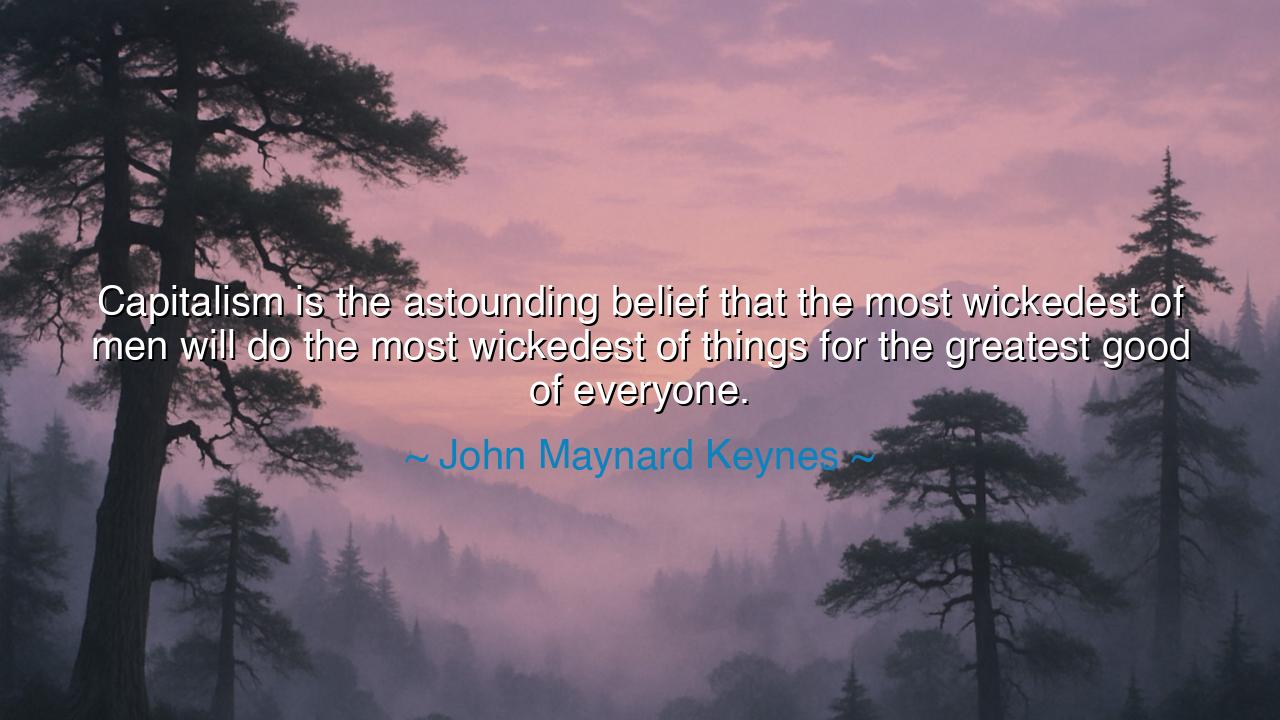
Capitalism is the astounding belief that the most wickedest of
Capitalism is the astounding belief that the most wickedest of men will do the most wickedest of things for the greatest good of everyone.






Hear now, O children of wisdom, the words of John Maynard Keynes, a sage of the modern world whose thoughts on economics were as piercing as the arrow of truth. He spoke thus: "Capitalism is the astounding belief that the most wickedest of men will do the most wickedest of things for the greatest good of everyone." These words are a mirror reflecting the paradox at the heart of the system we call capitalism. They challenge the very essence of how human nature is perceived to interact with greed, power, and morality. Keynes, in his infinite insight, saw that capitalism hinges on the belief that those who seek self-interest, often to the detriment of others, will, in the end, contribute to the common good.
In this statement, Keynes addresses the fundamental contradiction within the capitalist system — the belief that selfishness can somehow lead to collective prosperity. Capitalism is based on the assumption that individuals, motivated by their own desires for wealth and power, will, through their pursuit of self-interest, create opportunities for others, leading to the benefit of society as a whole. But Keynes, with a penetrating gaze, saw the inherent flaw in this idea: if the most powerful and wealthy are driven solely by greed, how can their actions, which harm others, truly lead to the welfare of all?
Consider, O children, the tale of Robert Barons, the titans of industry during the industrial revolution. Men like John D. Rockefeller, Andrew Carnegie, and J.P. Morgan built empires through methods that, by today’s standards, would be seen as deeply exploitative. Rockefeller, for instance, crushed competition, manipulated markets, and paid his workers so little that many lived in abject poverty. Yet, by the logic of capitalism, his actions — driven by ruthless self-interest — led to the creation of vast fortunes, the expansion of industry, and the proliferation of goods and services that helped fuel the economy. In the twisted logic of capitalism, it was believed that such wicked behavior would ultimately serve the greater good, benefiting society by creating jobs, wealth, and innovation.
Yet, even as society benefitted from the fruits of their labor, these men’s actions sowed seeds of inequality, exploitation, and suffering. How can such stark contradictions be reconciled? Keynes saw this paradox as an inherent flaw in the system — the idea that unrestrained pursuit of self-interest, by the "wickedest of men", could lead to a universal good is a fragile belief. It ignores the human cost of such practices: the lives of workers crushed beneath the weight of unjust labor conditions, the communities ruined by monopolies and environmental destruction. The good promised by capitalism is often built upon the backs of those who have little to show for their sacrifices.
Now, let us turn our gaze to the present day, where this very belief endures. Global corporations today, many with profits larger than the GDP of entire nations, continue to operate with a similar logic. Amazon, Walmart, and Apple, titans of the modern era, amass incredible wealth while exploiting labor in faraway lands and dodging taxes in their own nations. And yet, despite this, we are told that their dominance and the wealth they create benefits us all — through lower prices, job creation, and technological innovation. The argument remains unchanged: the pursuit of self-interest at the top will somehow lead to the greater good. But as Keynes warned, this belief is built on a fragile and dangerous foundation.
The lesson we must learn from Keynes’ words is clear: Self-interest does not always lead to the common good. When power is concentrated in the hands of the few, their actions often come at the expense of the many. The lesson is not just about capitalism, but about the fragility of systems that place too much faith in the idea that greed and power will serve a greater purpose. We must ask ourselves, when we see such systems in place, whether the greater good is truly being served, or if it is merely a facade behind which the powerful continue to exploit the weak.
And so, let us not be swayed by the false promises of an economic system that places unfettered self-interest at its core. It is our duty, as stewards of the future, to look beyond the gilded promises of capitalism and to demand justice, equity, and sustainability. Let us not follow blindly, but instead, with our eyes open, seek systems that do not rely on the wickedness of men to create good for all. May we build a world where goodness, compassion, and fairness guide our actions, and where the prosperity of one does not come at the cost of the suffering of another.






AAdministratorAdministrator
Welcome, honored guests. Please leave a comment, we will respond soon